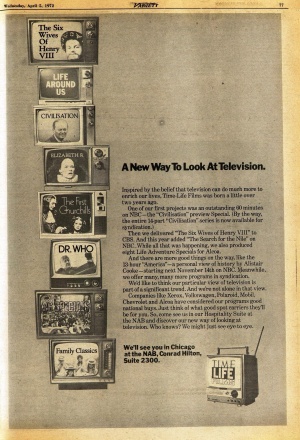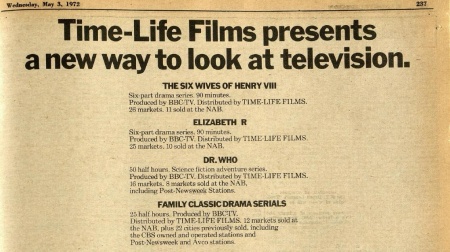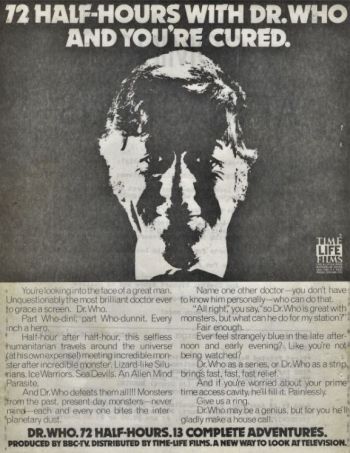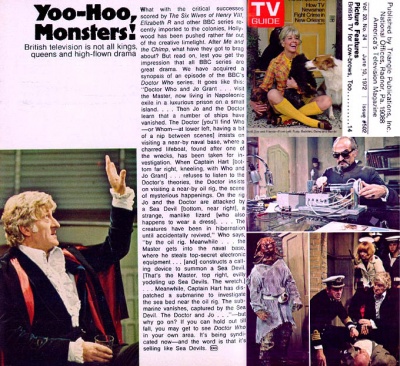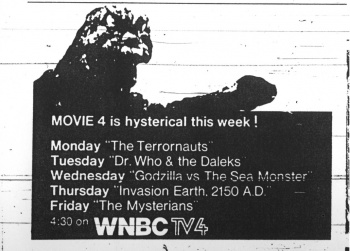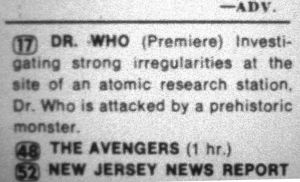Difference between revisions of "United States--1972"
From BroaDWcast
Jump to navigationJump to searchJon Preddle (talk | contribs) |
Jon Preddle (talk | contribs) |
||
| (28 intermediate revisions by 2 users not shown) | |||
| Line 2: | Line 2: | ||
| − | [[File:Time Life Films logo.JPG|right|thumb| | + | ==1971== |
| − | + | [[File:Time Life Films logo.JPG|right|thumb|100px|Time-Life Films logo]] | |
| − | *With the expansion of educational and public television services across the country, all hungry for quality material, the BBC strikes a distribution deal with Time Life Films, the film and television distribution division of media empire, [[Wikipedia: Time-Life Television|Time Life]]. This deal gives Time Life the exclusive rights to sell BBC product throughout the United States | + | *'''Early 1971''': With the expansion of educational and public television services across the country, all hungry for quality material, the BBC strikes a distribution deal with Time-Life Films, the film and television distribution division of media empire, [[Wikipedia: Time-Life Television|Time-Life]]. (The BBC's previous US distributor had been known as Peter M Robeck & Company Inc; it changed its name to Time-Life Films Inc in December 1969 as part of a merger.) |
| − | * | + | *This new deal gives Time-Life the exclusive rights to sell BBC product throughout the United States, Latin America and the Caribbean. The deal includes such fare as '''[[Wikipedia:War_and_Peace_%28TV_series%29|War & Peace]]''' (a co-production between Time-Life and BBC), '''The Ascent of Man''', and '''Doctor Who'''. |
| − | + | *'''February / March 1971''': In industry journals such as ''Broadcasting'' magazine, Time-Life reports that it is considering putting '''45 episodes''' of '''"Dr Who"''' on offer: this episode tally appears to cover [[Spearhead from Space]] through to [[Colony in Space]] only, although by the time this report was published, the latter story had not yet screened in the UK. | |
| + | *'''June 1971''': "Dr Misterio" commences in [[Costa Rica]]. Was this sale of the William Hartnell stories arranged through Time-Life Films, who also handled programme distribution to Latin America? | ||
| + | {{Blank lines|3}} | ||
| + | ==1972== | ||
| + | *By '''early 1972''', the package on offer is for '''50 episodes''', and includes the nine serials covering [[Doctor Who and the Silurians]] through [[Day of the Daleks]]), all in full colour. (Pertwee's debut serial, [[Spearhead from Space]] is no longer included in the package.) These episodes are converted from the PAL to NTSC (525-line 2-inch colour video tapes): | ||
| + | ---- | ||
='''[[Jon Pertwee stories|JON PERTWEE]]'''= | ='''[[Jon Pertwee stories|JON PERTWEE]]'''= | ||
| − | + | Nine stories, 50 episodes (initially) | |
| − | + | [[File:Broadcasting 3-4-72.JPG|right|300px|thumb|Time-Life Films ad, Variety, 5 April 1972 - DR WHO in the sixth TV down]] | |
| − | |||
| − | |||
| − | [[File:Broadcasting 3-4-72.JPG|right|300px|thumb|Time Life Films ad, | ||
| − | |||
| − | |||
| − | |||
{| {{small-table}} | {| {{small-table}} | ||
|- | |- | ||
| Line 38: | Line 37: | ||
|- | |- | ||
|KKK||[[Day of the Daleks]]||4 | |KKK||[[Day of the Daleks]]||4 | ||
| + | |- | ||
| + | |} | ||
| + | |||
| + | - [[Inferno]] is supplied with an early edit of part five, featuring a scene deleted from the UK broadcast. (This highlights that the BBC still held the original colour tapes of these three seasons as late as 1972.) | ||
| + | |||
| + | - [[Day of the Daleks]] is called "The Daleks" in publicity material, and subsequently appears under that title in many of the TV billings. | ||
| + | |||
| + | - One interesting thing about the promotional material, it never states the Doctor being from another planet. If anything, the publicity goes to great lengths to avoid mentioning anything about the good Doctor's alien origins. | ||
| + | |||
| + | |||
| + | *'''April 1972''': Time-Life presents the package of '''50 episodes''' at the '''April 1972''' [[wikipedia:National Association of Broadcasters|National Association of Broadcasters (NAB)]] event, initially selling to '''eight''' markets (as was later reported in the 3 May 1972 issue of ''Variety'' magazine). And indeed, station [[WPHL]], the first to purchase the series, did only buy that many episodes. | ||
| + | *By '''May 1972''', Time-Life sells the first '''50 episodes''' to a further '''eight''' markets, making '''16''' in total.[[File:TimeLifeMay72.JPG|450px|thumb|right|"50 half hours" sold to 16 markets, Time-Life ad; Variety, May 1972]] | ||
| + | {{clear}} | ||
| + | |||
| + | *'''June 1972''': By the middle of the year, a further '''four stories / 22 episodes''' is added to the package. All the markets that bought the earlier nine adventures purchase the additional four stories - except for [[WPHL]], which did not take up the extra set of episodes: | ||
| + | |||
| + | |||
| + | ---- | ||
| + | ='''[[Jon Pertwee stories|JON PERTWEE]] (continued)'''= | ||
| + | |||
| + | Four stories, 22 episodes: | ||
| + | |||
| + | {| {{small-table}} | ||
|- | |- | ||
|MMM||[[The Curse of Peladon]]||4 | |MMM||[[The Curse of Peladon]]||4 | ||
| Line 48: | Line 70: | ||
|- | |- | ||
|} | |} | ||
| − | + | {{Image table | |
| − | + | |[[File:PertweeTimeLife.jpeg|right|thumb|350px|Time-Life ad, circa 1972/73]]| | |
| − | + | [[File:TV Guide June 72.jpg|right|thumb|400px|TV Guide, June 1972]] | |
| − | + | }} | |
| − | + | * The '''10-16 June 1972''' issue of '''''[[TV Guide|TV GUIDE]]''''' has a two-page feature, '''Yoo-Hoo, Monsters!''' introducing viewers to "Dr Who", the Sea Devils and the Master. It reveals that the series was coming in "the fall". | |
| − | + | {{clear}} | |
| − | + | [[File:WNBCDaleks.jpg||right|thumb|350px|WNBC-TV4 screens the two Peter Cushing Dalek movies in July 1972]] | |
| − | + | *The two [[Peter Cushing]] Dalek movies were making frequent appearances on television by the early 1970s. For instance, both aired again on [[WNBC]] channel 4 in [[New York]] in '''July 1972''' as part of a week-long horror / monster movies marathon. | |
| + | {{clear}} | ||
---- | ---- | ||
| − | * '''21 AUGUST 1972''': '''Doctor Who''' makes its USA TV '''debut''' on WPHL, channel 17, in Philadelphia, [[Pennsylvania]]. | + | [[File:WPHLPremiere.JPG|thumb|right|300px|Philadelphia Inquirer billing, Dr Who (Premiere), 21 August 1972]] |
| + | * '''21 AUGUST 1972''': '''Doctor Who''' makes its USA TV '''debut''' on [[WPHL]], channel 17, in Philadelphia, [[Pennsylvania]]. | ||
---- | ---- | ||
| + | {{US nav}} | ||
| + | __NOTOC__ | ||
Latest revision as of 02:14, 6 December 2020
| United States Chronology | |
| 1963-1969 | 1971-1972 | 1973-1977 | 1978 | 1979 | 1980 | 1981 | 1982 | 1983 | 1984 | 1985 | 1986 | 1987 | 1988 | 1989 | 1990 | 1991-2020s | |
| Related articles | List of conventions | List of fan clubs | References to the USA in Doctor Who | Doctor Who USA Bus Tour | USA Bus Tour stops | Documentaries and specials | TV Guide | Saturday, March 12, 1988 | First airings by episode | Search by episode title or date | United States by the numbers | Chicago chronology | Time-Life Television |
1971
- Early 1971: With the expansion of educational and public television services across the country, all hungry for quality material, the BBC strikes a distribution deal with Time-Life Films, the film and television distribution division of media empire, Time-Life. (The BBC's previous US distributor had been known as Peter M Robeck & Company Inc; it changed its name to Time-Life Films Inc in December 1969 as part of a merger.)
- This new deal gives Time-Life the exclusive rights to sell BBC product throughout the United States, Latin America and the Caribbean. The deal includes such fare as War & Peace (a co-production between Time-Life and BBC), The Ascent of Man, and Doctor Who.
- February / March 1971: In industry journals such as Broadcasting magazine, Time-Life reports that it is considering putting 45 episodes of "Dr Who" on offer: this episode tally appears to cover Spearhead from Space through to Colony in Space only, although by the time this report was published, the latter story had not yet screened in the UK.
- June 1971: "Dr Misterio" commences in Costa Rica. Was this sale of the William Hartnell stories arranged through Time-Life Films, who also handled programme distribution to Latin America?
1972
- By early 1972, the package on offer is for 50 episodes, and includes the nine serials covering Doctor Who and the Silurians through Day of the Daleks), all in full colour. (Pertwee's debut serial, Spearhead from Space is no longer included in the package.) These episodes are converted from the PAL to NTSC (525-line 2-inch colour video tapes):
JON PERTWEE
Nine stories, 50 episodes (initially)
| BBB | Doctor Who and the Silurians | 7 |
| CCC | The Ambassadors of Death | 7 |
| DDD | Inferno | 7 |
| EEE | Terror of the Autons | 4 |
| FFF | The Mind of Evil | 6 |
| GGG | The Claws of Axos | 4 |
| HHH | Colony in Space | 6 |
| JJJ | The Daemons | 5 |
| KKK | Day of the Daleks | 4 |
- Inferno is supplied with an early edit of part five, featuring a scene deleted from the UK broadcast. (This highlights that the BBC still held the original colour tapes of these three seasons as late as 1972.)
- Day of the Daleks is called "The Daleks" in publicity material, and subsequently appears under that title in many of the TV billings.
- One interesting thing about the promotional material, it never states the Doctor being from another planet. If anything, the publicity goes to great lengths to avoid mentioning anything about the good Doctor's alien origins.
- April 1972: Time-Life presents the package of 50 episodes at the April 1972 National Association of Broadcasters (NAB) event, initially selling to eight markets (as was later reported in the 3 May 1972 issue of Variety magazine). And indeed, station WPHL, the first to purchase the series, did only buy that many episodes.
- By May 1972, Time-Life sells the first 50 episodes to a further eight markets, making 16 in total.
- June 1972: By the middle of the year, a further four stories / 22 episodes is added to the package. All the markets that bought the earlier nine adventures purchase the additional four stories - except for WPHL, which did not take up the extra set of episodes:
JON PERTWEE (continued)
Four stories, 22 episodes:
| MMM | The Curse of Peladon | 4 |
| LLL | The Sea Devils | 6 |
| NNN | The Mutants | 6 |
| OOO | The Time Monster | 6 |
- The 10-16 June 1972 issue of TV GUIDE has a two-page feature, Yoo-Hoo, Monsters! introducing viewers to "Dr Who", the Sea Devils and the Master. It reveals that the series was coming in "the fall".
- The two Peter Cushing Dalek movies were making frequent appearances on television by the early 1970s. For instance, both aired again on WNBC channel 4 in New York in July 1972 as part of a week-long horror / monster movies marathon.
- 21 AUGUST 1972: Doctor Who makes its USA TV debut on WPHL, channel 17, in Philadelphia, Pennsylvania.
| United States Chronology | |
| 1963-1969 | 1971-1972 | 1973-1977 | 1978 | 1979 | 1980 | 1981 | 1982 | 1983 | 1984 | 1985 | 1986 | 1987 | 1988 | 1989 | 1990 | 1991-2020s | |
| Related articles | List of conventions | List of fan clubs | References to the USA in Doctor Who | Doctor Who USA Bus Tour | USA Bus Tour stops | Documentaries and specials | TV Guide | Saturday, March 12, 1988 | First airings by episode | Search by episode title or date | United States by the numbers | Chicago chronology | Time-Life Television |

